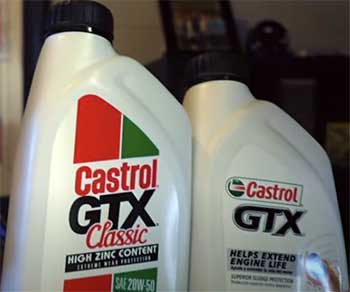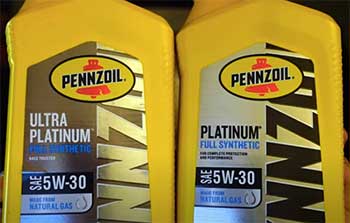When it comes to engine oils, two brand names frequently surface – Castrol GTX and Pennzoil. But how do these popular oils stack up against each other? What are the pros and cons of each?
In this comprehensive review, we’ll dive into an analytical comparison of Castrol GTX and Pennzoil, offering insights to help you make an informed choice.
A Brief Comparison Table
| Feature | Castrol GTX | Pennzoil |
|---|---|---|
| Formulation and Protection | Emphasizes on anti-sludge properties with its Double Action formula, which provides exceptional deposit protection | Famed for its superior active cleansing agents that help in maintaining engine cleanliness |
| High Temperature Performance | Exhibits high thermal stability, able to maintain its viscosity even under extreme conditions | Performs well under typical conditions but may not offer the same level of thermal stability in high-temperature environments |
| Pricing | Slightly premium due to its advanced protection and high thermal stability | More budget-friendly option that provides superior engine cleaning capabilities |
| Primary Benefit | Ensures maximum engine cleanliness and longevity, optimal for high-stress conditions | Known for excellent engine cleanliness with a more affordable price point, optimal for regular usage |
What Is Castrol GTX?

Castrol GTX is a premium multi-viscosity oil, hailed for its advanced engine protection.
Manufactured by Castrol, a British global brand, it’s renowned for its robust defense against harmful deposit build-up, which contributes to improved engine performance.
Pros of Castrol GTX
- Exceptional Deposit Protection
Castrol GTX is acclaimed for its exceptional anti-sludge properties. Its unique Double Action formula clears away old sludge while preventing new ones.
By keeping the engine clean, it facilitates the engine’s smooth functioning, enhancing longevity.
- High Stability at High Temperatures
Its proprietary formula offers strong thermal stability, making it an excellent option for high-temperature environments. It can maintain its viscosity even under extreme conditions, ensuring optimal engine performance.
Cons of Castrol GTX
- Slightly Premium Pricing
Despite the benefits, Castrol GTX falls on the pricier end of the spectrum. Its cost can be a deterrent for budget-conscious consumers seeking regular oil changes.
Also Read: Differences Between Super Tech And Castrol Oil.
What Is Pennzoil?

Pennzoil, an American-made oil, is highly respected for its superior active cleansing agents.
It helps keep engines clean by preventing contaminants from forming deposits, which can affect the engine’s efficiency.
Pros of Pennzoil
- Excellent Cleansing Capabilities
Pennzoil’s cleansing agents offer superior engine cleaning capabilities.
They help in maintaining engine cleanliness, thus preserving the engine’s health and overall performance.
- Cost-Effective
Pennzoil often is more budget-friendly compared to Castrol GTX. For consumers seeking economical choices, Pennzoil can be an attractive option without compromising on performance.
Cons of Pennzoil
- Not as Thermally Stable
While Pennzoil performs well in typical scenarios, it may lack the thermal stability offered by Castrol GTX in high-temperature conditions. This could result in a higher rate of oil consumption in these extreme environments.
Key Differences Between Castrol GTX And Pennzoil
Understanding the subtle distinctions between Castrol GTX and Pennzoil is crucial for making an informed decision. Let’s delve into the key differences that set these two renowned brands apart.
- Formulation and Protection
Castrol GTX’s formulation focuses heavily on anti-sludge properties. Its Double Action formula ensures maximum deposit protection, keeping your engine clean and enhancing its performance.
This focus on sludge protection allows it to offer a robust defense against harmful deposit build-up, a common cause of engine degradation.
On the other hand, Pennzoil prides itself on its active cleansing agents that provide excellent engine cleaning capabilities. It helps maintain engine cleanliness by preventing harmful contaminants from turning into performance-diminishing deposits.
- Performance in High Temperatures
When it comes to operating in high-temperature environments, Castrol GTX has a slight edge over Pennzoil.
Its high thermal stability ensures that it maintains its viscosity even under high-stress conditions, offering optimal engine performance and minimizing the rate of oil consumption.
While Pennzoil also performs well in a wide range of conditions, it may not provide the same level of thermal stability as Castrol GTX, potentially leading to a slightly higher rate of oil consumption in high-temperature conditions.
- Pricing
In terms of pricing, there’s a noticeable difference between these two oils. Castrol GTX, with its advanced protection and high thermal stability, is on the pricier side. This premium pricing could deter budget-conscious consumers who need regular oil changes.
In contrast, Pennzoil offers a more budget-friendly option without compromising on performance. Its superior cleaning capabilities combined with its economical price point make it a preferred choice for many vehicle owners.
The choice between Castrol GTX and Pennzoil is largely dependent on the specific needs of your vehicle and your personal preferences.
Whether you prioritize thermal stability and advanced protection or cost-effectiveness and superior cleaning capabilities, both of these engine oils have proven their worth in the automotive industry.
Also Read: Comparison of Castrol And Quaker State Oil.
Frequently Asked Questions (FAQs)
Technically, yes. It’s not ideal, but in an emergency, you could mix different brands of oil, including Castrol and Pennzoil. However, it’s better to stick with one brand for optimal performance and engine protection.
Absolutely. Pennzoil is a reputable brand that offers excellent cleansing capabilities. It’s also more cost-effective compared to other premium brands, making it a popular choice among vehicle owners.
Castrol GTX comes in several different grades to cater to various vehicle requirements. Common grades include 5W-30, 10W-30, and 20W-50. Always consult your vehicle manual for the correct oil grade.
The best engine oil depends largely on your vehicle type and your specific needs. Brands like Castrol, Pennzoil, Mobil 1, and Valvoline are all reputable manufacturers known for producing high-quality engine oils.
Final Thoughts
In conclusion, the choice between Castrol GTX and Pennzoil depends on your specific needs and circumstances. If you are looking for exceptional thermal stability and deposit protection, Castrol GTX is your oil.
However, if you want a more cost-effective option with excellent cleansing capabilities, Pennzoil is a solid choice. Always remember to refer to your vehicle’s manual to identify the best oil for your engine.

